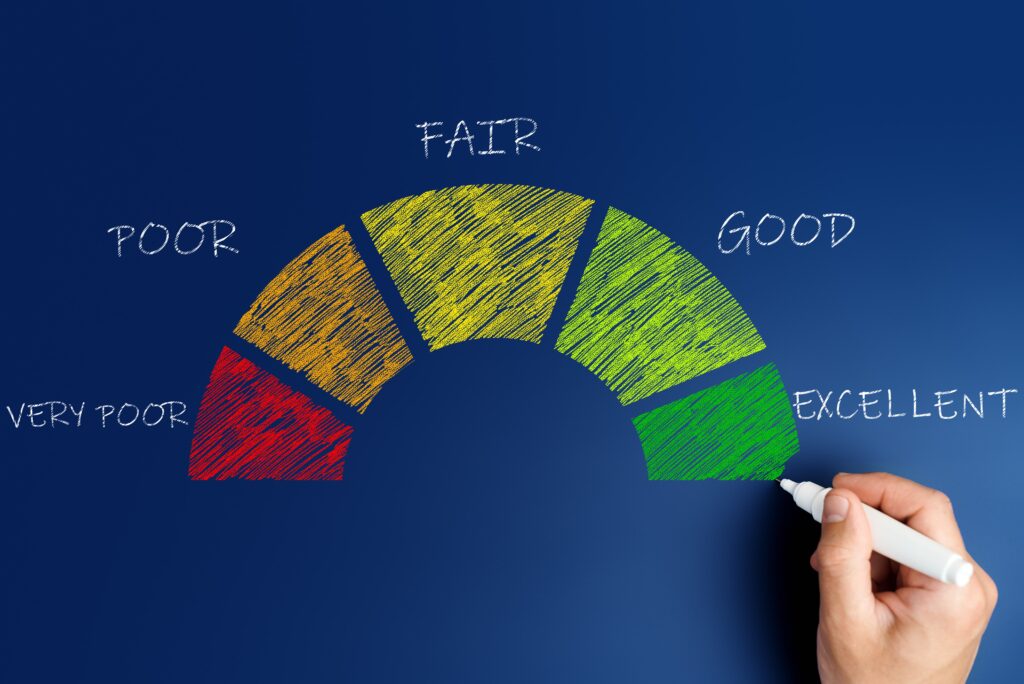Below we answer the question how long does it take to rebuild credit scores after debt relief, steps to accelerate the process, and tips for maintaining a healthy credit score.
For many Americans, there are times when life is a financial struggle. You may have lost your job or had hours cut, and debts pile up. After you last made credit card payments several months ago, there is a high chance the card will be closed, and the debt collectors will start to call. Or, you can only afford to make minimum credit card payments.
Either way, you are paying much interest and damaging your credit.
In this situation, some consumers turn to debt settlement or relief to pay off their debts and return on firm financial grounds. However, debt settlement has downsides, including the hit your credit score takes.
The Basics: Understanding Credit Scores and Debt Relief
What is a Credit Score?
A credit score is a numerical representation of your creditworthiness, which lenders use to determine your eligibility for loans, credit cards, and other financial products. A higher score indicates a lower risk of defaulting on your debts.
How Debt Relief Impacts Credit Scores
A major downside of applying for debt relief is that it will negatively affect your credit score. Getting a debt settlement plan with your creditors may allow you to pay less than you owe and get out of debt faster than making minimum payments. However, this will result in a ‘settled’ black mark on your credit report that will immediately lower your score by 50 or 100 points, depending on how much debt relief you get.
How bad the debt relief plan will hurt your credit depends on these factors:
- The large the relief, the more the drop. It can be 100 points for a large amount of debt relief and 50 or 65 for less.
- The creditor is a big part of how much your score drops. Some credit card companies are diligent about reporting debt relief charge-offs, while others don’t.
- However, debt relief will impact your credit score less than not making payments.
Regarding how long debt relief stays on your credit report, it will remain there for seven years. So, for seven years, your credit score can be affected by having a debt settlement plan.
However, as time passes, the impact of the debt relief will be less; most lenders look at your most recent payment history when making credit decisions. For the first one or two years, you will probably have more creditors deny credit than approve it. But if you make all of your monthly payments on time on all credit accounts, the impact on your score will lessen over time.
Most experts say your score will take six to 24 months to rise significantly. If you plan to apply for a home loan, you should wait a year after debt relief to get approved.
Debt Settlement Or Debt Relief Overview
The term’ debt relief’ usually refers to debt settlement. This involves a debt settlement company working with your credit card providers to settle the debt for part of what is owed. The process begins by giving the debt relief company a list of the credit cards you want to pay off.
The company creates a payment plan and combines what you owe into one account. You pay every month into an escrow account they set up, and when there is enough money there, the company attempts to settle debts with the credit card companies.
Debt settlement companies can be effective for many people, but the service usually costs thousands of dollars, and it takes several years usually to pay off debts. You can also serve as your debt settlement agency and contact the credit card companies to try to settle for less than you owe. However, it would help if you had a lot of patience and tenacity because the credit card companies will probably be reluctant to work with you to pay less than you owe.
Rebuilding Credit Scores After Debt Relief: A Timeline
The timeline for rebuilding your credit score after debt relief depends on various factors, including the relief you’ve received and your overall financial situation. Let’s look at the different stages of credit repair:
Stage 1: Initial Recovery Period
Immediately after debt relief, you may see a drop in your credit score due to late payments and other negative marks. However, as you make on-time payments and reduce your debt, your score should improve. This process can take months to years, depending on your circumstances.
Stage 2: Dispute Resolution
If you’ve identified errors or inaccuracies on your credit report, you can file disputes to correct them. This process typically takes about three to six months, although it may be shorter if you only have a few disputes.
Stage 3: Long-Term Recovery
After resolving disputes and improving your credit habits, you’ll enter the long-term recovery phase. Derogatory marks can remain on your credit report for up to 7 years or ten years in the case of bankruptcy. However, proposed legislation may reduce these timeframes to 4 years for derogatory marks and seven years for bankruptcy, though this change has yet to be enacted.
Tips for Accelerating Credit Score Recovery
While rebuilding your credit score takes time, there are steps you can take to speed up the process:
- Monitor your credit report: Regularly review your credit report for errors and inaccuracies that could hurt your score.
- Pay your bills on time: Establishing a history of timely payments can significantly improve your credit score.
- Reduce your credit utilization: Keep your credit card balances below 30% of your credit limits.
- Diversify your credit mix: Maintain a healthy combination of different types of credit, such as installment loans and revolving credit.
- Avoid applying for new credit too frequently: Each new credit application can result in a hard inquiry, temporarily lowering your score.
How to rebuild your credit scores after debt relief summary

In conclusion, rebuilding your credit score after debt relief can take a few months to several years, depending on your situation and financial habits. By monitoring your credit report, making on-time payments, and managing your debt responsibly, you can accelerate the credit repair process and achieve a healthier financial future.
If you’re interested in Debt Relief and want to speak to a professional, Contact Us Today!
Frequently Asked Questions (FAQs)
How long does it take to rebuild credit scores after debt relief?
The time it takes to rebuild your credit score after debt relief depends on your specific situation, but it can range from a few months to several years.
How can I speed up my credit score recovery after debt relief?
To accelerate your credit score recovery, pay your bills on time, monitor your credit report for errors, maintain a low credit utilization, diversify your credit mix, and avoid applying for new credit too frequently.
Will the proposed legislation change how many derogatory marks stay on my credit report?
If enacted, the proposed legislation would reduce the time derogatory marks remain on your credit report from 7 years to 4 years and from 10 years to 7 years for bankruptcy. However, this change has yet to be enacted.
What are the stages of credit score recovery after debt relief?
The stages of credit score recovery after debt relief include the initial recovery period, dispute resolution, and long-term recovery.
